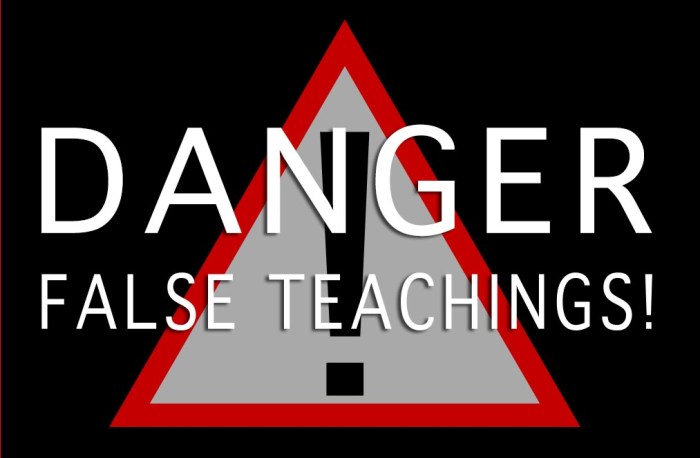Torah to the tribes false teachings – Embarking on an exploration of Torah to the Tribes, this discourse delves into the realm of false teachings and their profound implications. Throughout history, the Torah has been subjected to misinterpretations and distortions, leading to misconceptions and divisions within the Jewish community.
This article aims to shed light on these false teachings, their historical context, and their impact on Jewish identity and practice.
By examining the historical context of the Torah, we can gain insights into how different interpretations have emerged over time. The role of tradition and rabbinic authority in Torah interpretation will be explored, along with the strengths and limitations of relying on these sources.
Furthermore, modern approaches to Torah interpretation, such as critical scholarship and feminist perspectives, will be discussed, highlighting their advantages and disadvantages.
False Teachings and Misinterpretations of the Torah

Throughout history, certain teachings and interpretations have emerged that have distorted the true meaning and intent of the Torah. These false teachings have led to misunderstandings, misconceptions, and a departure from the authentic message of the Torah.
One common false teaching is the belief that the Torah is a rigid set of rules and regulations that must be followed strictly. This legalistic approach to the Torah overlooks the underlying principles and values that give it meaning. It can lead to a superficial adherence to the letter of the law while neglecting the spirit of compassion, justice, and love that is at the heart of the Torah.
Examples of False Teachings
- The Torah is a literal historical account:Some teachings present the Torah as a purely historical document, ignoring its symbolic and spiritual dimensions. This literalist approach fails to appreciate the nuanced and multifaceted nature of the Torah’s narratives.
- The Torah promotes violence and intolerance:False interpretations have distorted the Torah’s teachings on war and conflict, presenting them as a justification for violence and hatred. This misrepresentation ignores the Torah’s emphasis on peace, reconciliation, and the protection of human life.
- The Torah is only for Jews:Some teachings limit the relevance of the Torah to the Jewish people, excluding non-Jews from its teachings. This narrow interpretation contradicts the universal message of the Torah, which is intended for all humanity.
Consequences of Misinterpreting the Torah
Misinterpreting the Torah has serious consequences. It can lead to:
- A distorted understanding of God:False teachings can present a distorted image of God, portraying Him as vengeful, arbitrary, or distant. This undermines the true nature of God as a loving, compassionate, and just being.
- A lack of spiritual growth:Misinterpretations of the Torah can hinder spiritual growth by obscuring its true teachings. They can lead to a superficial understanding of the Torah and its profound message.
- Division and conflict:False teachings can sow division and conflict within religious communities and between different faith traditions. They can create barriers to understanding and reconciliation.
The Historical Context of the Torah and Its Impact on Interpretation

The Torah, the foundational text of Judaism, was composed over a period of centuries, reflecting the historical, cultural, and religious experiences of the ancient Israelites. Its interpretation has been shaped by various factors, including the historical context in which it was written, the cultural influences of the time, and the evolving understanding of its teachings.
Historical Context
The Torah was written during a transformative period in the history of the Israelites. The Israelites emerged from slavery in Egypt and embarked on a journey to establish their own nation in the Promised Land. During this time, they faced numerous challenges and conflicts, which influenced the development of their religious beliefs and practices.
The Torah reflects the Israelites’ experiences of oppression, liberation, and the establishment of a covenant with God.
Cultural Influences
The Torah was also influenced by the cultural context of the ancient Near East. The Israelites interacted with neighboring cultures, such as the Babylonians, Canaanites, and Egyptians. These interactions led to the incorporation of certain cultural elements into the Torah, including legal codes, ethical principles, and literary forms.
Evolving Understanding
The interpretation of the Torah has evolved throughout history. In the early rabbinic period, the rabbis developed a systematic approach to interpreting the text, known as Midrash. Midrash sought to uncover the hidden meanings and implications of the Torah, using a variety of literary techniques.
Over time, different schools of thought emerged, each with its own unique approach to interpretation.
The Role of Tradition and Rabbinic Authority in Torah Interpretation
Tradition and rabbinic authority play a significant role in interpreting the Torah. The Torah, the foundational text of Judaism, is a complex and multifaceted document that has been subject to centuries of interpretation and commentary. Rabbinic tradition and teachings have profoundly influenced how the Torah is understood and applied, shaping Jewish thought and practice.
Rabbinic Teachings and Commentaries
Rabbinic teachings, known as the Oral Torah, provide additional insights and interpretations of the Torah’s written text. These teachings, transmitted orally from generation to generation, were eventually compiled into written form in the Talmud and other rabbinic works. Rabbinic commentaries, such as the Rashi and Ramban commentaries, offer detailed explanations, linguistic analysis, and historical context to help readers understand the Torah’s meaning.
Strengths of Relying on Tradition and Rabbinic Authority
- Preservation of Knowledge:Tradition and rabbinic authority ensure the preservation and transmission of Torah knowledge across generations, preventing its loss or distortion.
- Authoritative Guidance:Rabbinic teachings provide authoritative guidance on Torah interpretation, helping individuals navigate complex and ambiguous passages.
- Historical Context:Rabbinic commentaries offer historical context and insights into the Torah’s composition and development, enhancing our understanding of its original intent.
Limitations of Relying on Tradition and Rabbinic Authority
- Potential for Bias:Rabbinic interpretations may reflect the biases and perspectives of their time, potentially influencing the understanding of the Torah.
- Divergence from Original Meaning:Over time, rabbinic teachings and commentaries may diverge from the original meaning of the Torah, leading to interpretations that may not be faithful to the text.
- Lack of Objectivity:Relying solely on tradition and rabbinic authority can limit objectivity and critical analysis of the Torah, potentially stifling intellectual inquiry.
Modern Approaches to Torah Interpretation

Modern approaches to Torah interpretation have emerged in response to the challenges posed by critical scholarship and the rise of feminist perspectives. These approaches seek to provide new insights into the text while also respecting its traditional authority.
One of the most influential modern approaches is critical scholarship, which applies the methods of historical and literary criticism to the Torah. This approach seeks to understand the Torah in its historical context and to identify the different literary genres and forms that are present in the text.
Critical scholars argue that the Torah is not a single, monolithic text, but rather a collection of texts that were written over a long period of time by different authors.
Another important modern approach is feminist interpretation, which seeks to uncover the ways in which the Torah has been used to oppress women. Feminist interpreters argue that the Torah contains patriarchal biases that have been used to justify the subordination of women.
They seek to challenge these biases and to develop new interpretations of the Torah that are more inclusive of women.
Modern approaches to Torah interpretation have had a significant impact on the way that the text is understood. They have challenged traditional interpretations of the Torah and have opened up new possibilities for understanding its meaning.
Advantages and Disadvantages of Modern Approaches
Modern approaches to Torah interpretation have both advantages and disadvantages. One of the advantages of these approaches is that they can provide new insights into the text. By applying the methods of critical scholarship and feminist interpretation, modern interpreters can uncover hidden meanings and perspectives that have been overlooked by traditional interpreters.
However, modern approaches to Torah interpretation also have some disadvantages. One of the main disadvantages is that they can be seen as undermining the authority of the text. By challenging traditional interpretations, modern interpreters can create the impression that the Torah is not a reliable or authoritative source of truth.
Another disadvantage of modern approaches to Torah interpretation is that they can be divisive. By taking different approaches to the text, modern interpreters can create different interpretations of the Torah. This can lead to disagreement and division within the Jewish community.
How Modern Approaches Have Challenged Traditional Interpretations
Modern approaches to Torah interpretation have challenged traditional interpretations of the text in a number of ways. First, they have challenged the idea that the Torah is a single, monolithic text. Modern interpreters argue that the Torah is a collection of texts that were written over a long period of time by different authors.
This means that the Torah contains a variety of different perspectives and viewpoints.
Second, modern approaches to Torah interpretation have challenged the idea that the Torah is a divinely inspired text. Modern interpreters argue that the Torah is a human text that was written by people who were influenced by their own time and culture.
This means that the Torah is not immune to error and bias.
Third, modern approaches to Torah interpretation have challenged the idea that the Torah is a text that is only relevant to Jews. Modern interpreters argue that the Torah contains universal truths that are relevant to all people. This means that the Torah can be a source of wisdom and guidance for people of all faiths and backgrounds.
The Impact of False Teachings on Jewish Identity and Practice

False teachings about the Torah have had a significant impact on Jewish identity and practice. These teachings have led to divisions and misunderstandings within the Jewish community, and have threatened the integrity of Jewish tradition.
Divisions within the Jewish Community, Torah to the tribes false teachings
False teachings have often led to divisions within the Jewish community. For example, the Karaite movement, which rejected the authority of the Talmud, emerged in the 8th century CE as a response to what its adherents saw as corruptions in rabbinic Judaism.
The Karaites believed that the Torah should be interpreted literally, without the addition of rabbinic commentary. This led to a split within the Jewish community, as the Rabbinic Jews rejected the Karaite interpretation of the Torah.
Misunderstandings of Jewish Tradition
False teachings can also lead to misunderstandings of Jewish tradition. For example, some Christian missionaries have argued that the Torah predicts the coming of Jesus Christ. This interpretation of the Torah is not accepted by the vast majority of Jews, who believe that the Torah is a purely Jewish text that does not refer to Jesus Christ.
Importance of Addressing False Teachings
It is important to address false teachings about the Torah in order to preserve the integrity of Jewish tradition. When false teachings are allowed to spread unchecked, they can undermine the authority of the Torah and lead to confusion and division within the Jewish community.
By addressing false teachings, we can help to ensure that the Torah remains a source of unity and guidance for the Jewish people.
Query Resolution: Torah To The Tribes False Teachings
What are some examples of false teachings about the Torah?
False teachings can include misinterpretations of the Torah’s commandments, historical events, or ethical principles. For example, some false teachings may claim that the Torah condones violence or discrimination, or that it requires strict adherence to outdated customs.
How can false teachings impact Jewish identity?
False teachings can lead to confusion and disillusionment, causing individuals to question their connection to Judaism. They can also create divisions within the Jewish community, as different groups may hold conflicting interpretations of the Torah.
What is the importance of addressing false teachings?
Addressing false teachings is crucial for preserving the integrity of Jewish tradition and promoting a deeper understanding of the Torah. By confronting these false teachings and promoting accurate interpretations, we can strengthen Jewish identity and foster a more cohesive and informed Jewish community.